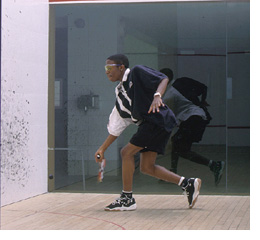

 In 2001, the Bates College men's squash team
had its best season ever. A challenging regular season schedule that featured
six matches against Ivy League opponents set the Bobcats up for their first
entry into the Hoehn Division of the National Intercollegiate Squash Racquets
Association (NISRA) national championships, the second-highest tier of the tournament.
Bates posted a 15th-place finish by downing in-state rival Bowdoin in their
final match of the tournament. The Bobcats posted a 12-12 record at the end
of the season, with half of those wins coming by scores of 9-0 or 8-1. Under
coach Paul Gastonguay, the squad posted a 4-1 record over in-state rivals
Bowdoin and Colby. The 2001-02 season will be the team's first under John
Illig, who has served as women's tennis and squash coach for the past five
years.
In 2001, the Bates College men's squash team
had its best season ever. A challenging regular season schedule that featured
six matches against Ivy League opponents set the Bobcats up for their first
entry into the Hoehn Division of the National Intercollegiate Squash Racquets
Association (NISRA) national championships, the second-highest tier of the tournament.
Bates posted a 15th-place finish by downing in-state rival Bowdoin in their
final match of the tournament. The Bobcats posted a 12-12 record at the end
of the season, with half of those wins coming by scores of 9-0 or 8-1. Under
coach Paul Gastonguay, the squad posted a 4-1 record over in-state rivals
Bowdoin and Colby. The 2001-02 season will be the team's first under John
Illig, who has served as women's tennis and squash coach for the past five
years.
While the Bobcats will have to replace Sean Doherty '01, their No. 1 player for the past four seasons, their is reason to believe that their success will continue. Sophomore Ben Schippers '04, ranked in the top 20 nationally in the Under-19 age group, moved into the second spot on Bates' ladder, while No. 3 player Eric Lopez '03 reached the finals of the consolation bracket of the NISRA indivudual championships. Seniors Sam Huleatt '02 and Ethan Kerr '02, who played Nos. 4 and 5 last season, will serve as co-captains for the second year in a row. ]
Squash begins its season Nov. 1, with the first of approximately 25 matches beginning two weeks later and ending the first week of March. In addition to playing opponents within NESCAC, Bates' schedule includes six Ivy League opponents and top-rated teams such as Denison, Franklin & Marshall and the U.S. Naval Academy.Bates plays its home matches in the Waldo Reis Wing of Merrill Gymnasium, which offers six American courts and two converted 20-foot racquetball courts. Three of the eight courts are glass-backed, ideal for videotaping and viewing of matches.
Men's squash at Bates has a tradition of success. Sportsmanship and respect are the two most important aspects of any Bates team. Every player on the squad shows respect for himself, his teammates and his opponents by never giving up, no matter how difficult the situation. From this respect comes dedication and teamwork. Bates players must be prepared mentally and physically for every practice and every match. Win or lose, the Bobcats "leave everything on the court." A strong mental game and sportsmanship are inseparable. Bates squash players learn from each situation and build on positive play and strategies. They have pride in their preparation, work ethic and hustle. Every player succeeds when this approach is taken, because selflessness breeds success. The team might not always be victorious, but it will always be in a position to win every match.
 John Illig (jillig@bates.edu)
is in his 11th year as a collegiate squash and tennis coach and his first
as men's squash coach at Bates. As head coach of Bates' women's team, Illig
has led the Bobcats to five consecutive B-flight appearances at Howe Cup,
has coached two All-Americans and two Ann Wetzel Award winners and was voted
Women's Intercollegiate Squash Association's (WISA) 1999-2000 Clarence C.
Chaffee Award for the coach whose team best demonstrates the characteristics
of sportsmanship and competitiveness. He was also named U.S. Developmental
Coach of the Year by the United States Olympic Committee in 2000. Illig came
to Bates in 1996 following five years as head coach at Colby College. A 1986
graduate of the University of Rochester played three years of team-tennis
in Germany. He has through-hiked the Appalachian Trail and the Pacific Crest
Trail. In 1998 he published Trail Ways, Path Wise, an AT narrative.
John Illig (jillig@bates.edu)
is in his 11th year as a collegiate squash and tennis coach and his first
as men's squash coach at Bates. As head coach of Bates' women's team, Illig
has led the Bobcats to five consecutive B-flight appearances at Howe Cup,
has coached two All-Americans and two Ann Wetzel Award winners and was voted
Women's Intercollegiate Squash Association's (WISA) 1999-2000 Clarence C.
Chaffee Award for the coach whose team best demonstrates the characteristics
of sportsmanship and competitiveness. He was also named U.S. Developmental
Coach of the Year by the United States Olympic Committee in 2000. Illig came
to Bates in 1996 following five years as head coach at Colby College. A 1986
graduate of the University of Rochester played three years of team-tennis
in Germany. He has through-hiked the Appalachian Trail and the Pacific Crest
Trail. In 1998 he published Trail Ways, Path Wise, an AT narrative.
| |
©2001
Bates College. All Rights Reserved. Last modified: 6/22/01 by asl
|